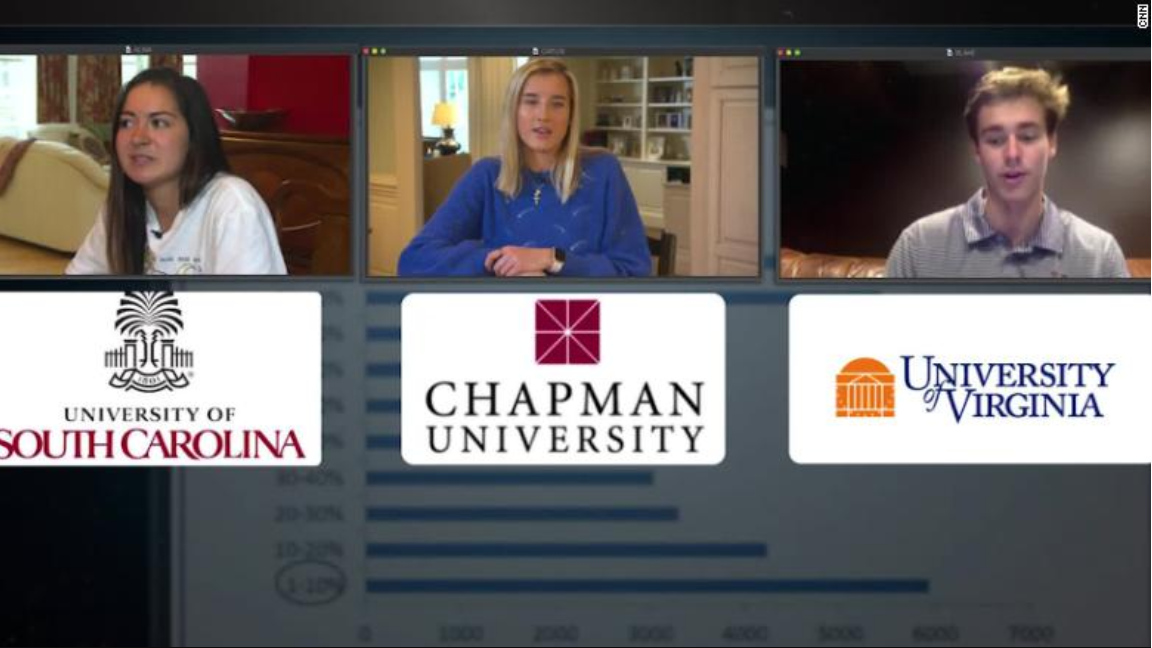Brian Ries and Meg Wagner:Universities begin considering canceling in-person classes until 2021
date:2020-04-15 09:15author:adminsource: Brian Ries and Meg Wagner, CNviews:

(CNN)A number of universities are beginning to consider the possibility that in-person classes may not resume until 2021.
Boston University has already canceled all "in-person summer activities" on its primary campus. But the school's coronavirus recovery plan includes protocols should officials deem it not safe to return in-person for the fall semester, and says classes would continue to be held remotely through the fall semester.
"The Recovery Plan recognizes that if, in the unlikely event that public health officials deem it unsafe to open in the fall of 2020, then the University's contingency plan envisions the need to consider a later in-person return, perhaps in January 2021," the university said in an online statement.
The school will "offer remote learning courses this summer" and it plans to "continue providing the minimal housing and dining services that are currently available."
President Robert A. Brown sounded hopeful that Boston University would allow students to return on the fall -- a "best-case scenario" -- and until then would focus its efforts on finding "the best and safest way" to do that. Jean Morrison, the provost and chief academic officer, told NBC10 Boston that while suspending the fall semester is a possibility, it's not the one they're aiming for. "We're focusing our planning on a fall return to campus," she said.
The news underscores just how upending the coronavirus has been to the reliable beats of higher education, where schools are facing once unimaginable changes to their ways of life.
With classes moved online, spring break canceled, summer jobs furloughed and commencement ceremonies postponed, students remained largely hopeful that the fall would bring an end to the uncertainty.
Nicole Somerstein, a junior at BU who is aiming to graduate in May 2021, told CNN she was saddened by the possibility, but doesn't feel that it's unreasonable, given the coronavirus's widespread impact.
"I think BU is definitely doing the right thing, and throughout this entire process have shown that they care about our well-being more than anything else," she said. "The possibility is sad, but I understand that they have to consider all scenarios."
An increasing number of schools are doing exactly that
Harvard, which was one of the first universities to send students home earlier this spring in a bid to "de-densify" its campus, is considering "lots of different scenarios" for the fall semester, President Lawrence S. Bacow said in an interview last week.
One of the issues, he said, is that at some point decisions will have to be made and there will still be "a tremendous amount of uncertainty" with regard to the virus.
Oregon State, like most colleges in the US, moved most of its summer instruction online. As for the fall semester, OSU spokesman Steve Clark told The Oregonian, "Only the novel coronavirus will determine what happens. We can hope for a full return in fall 2020, but hope is not a strategy. So that is why we are going to prepare as best we can for every possible contingency."
And the University of Arizona said it remains hopeful the fall semester would include a return to campus.
"We are cautiously optimistic that the fall semester will be able to launch with the normal face-to-face campus experience, but of course we will prioritize the health and well-being of our community in making that decision," the university said in a statement to the Arizona Daily Star.
It's good to plan well ahead
Eric Feigl-Ding, an epidemiologist and visiting scientist at the Harvard T.H. Chan School of Public Health, told CNN that the colleges are doing the right thing by planning for the unexpected.
"I think colleges should all definitely make plans for delaying start dates and for intermittent closings and reopenings, because epidemiology modeling suggests we may have to go into open and close waves until potentially even 2022," he said.
Researchers from the Chan school said Tuesday that the US may have to endure social distancing measures, such as stay-at-home orders and school closures, until 2022.
That is, unless, a vaccine becomes quickly available.
"Intermittent distancing may be required into 2022 unless critical care capacity is increased substantially or a treatment or vaccine becomes available," the researchers wrote.
Another important factor: Whether people become immune to the new coronavirus after they have been infected.
That's simply not yet known.
Note: This story was updated


